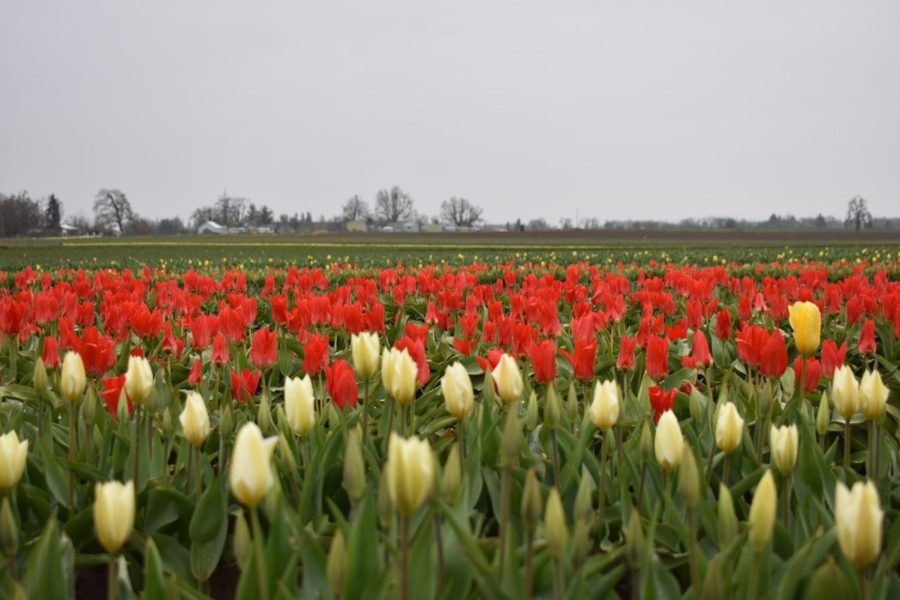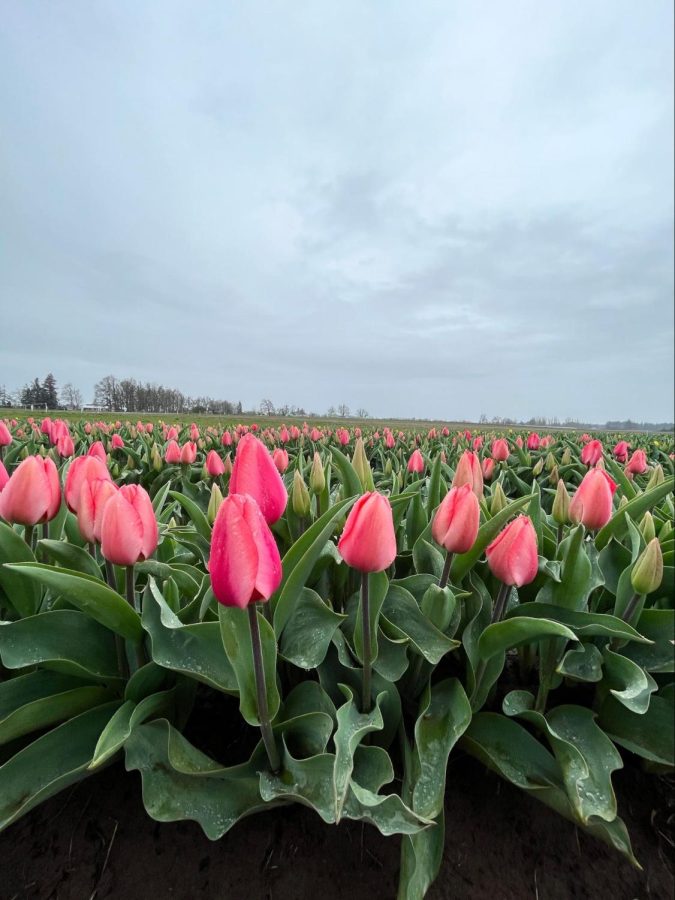Wooden Shoe Tulip Fest’s legacy attracts visitors from across the world
April 14, 2023
Wooden Shoe Tulip Farm located in Woodburn, Oregon, attracts visitors from all over the world for its annual tulip festival. This year marks the farm’s 39th festival.
Wooden Shoe Tulip Farm is the epitome of a small, local farm success story. The farm is run by the Iverson family, who bought the ‘original farm’ in 1950. Ross and Dorthy Iverson had six kids, four of which continue to run the farm. The other two come back to help out during the festival. Since then the farm has continued to grow and will stay in family hands as the next generation joins their precursors.
In 1974, the farm began growing tulips for Dr. Clyde Holman, who was one of the first people who discovered how to make tulips bloom early. Tulips are temperature sensitive and so they need seasons in order to bloom. Holman discovered how to mimic the seasons by growing them in the Willamette Valley and then shipping them back to Terre Haute, Indiana. When he retired in the late 1970s, the Iverson family bought a few acres from him. By 1983, the family had over 15 acres of land, and more of the Iverson children and family relatives returned to help out. From there, the Wooden Shoe Bulb Company was born.
Barb Iverson, one of the siblings and the co-owner of the farm, would go to garden shows along with her siblings and try to sell bulbs from their bulb catalogs. However, selling the bulbs retail wasn’t profitable. In 1985, their neighbors suggested they open the farm to the public—something the Iverson family had never thought about. “And of course, we’re farm kids,” said Iverson. “We’re surrounded by this beauty but we take it for granted because all we see is the work.” They decided to open the farm up for Easter weekend as the crop was in full bloom. They put an ad in the local newspaper, and come Easter weekend there was a “little traffic jam.”
“Not a lot of cars,” said Iverson. “But it was like, oh, maybe people do want to come out and see this.”
Over the years the farm has continued to attract more crowds, and people from all over have continued to come to see the tulips and partake in the fun. Vendor booths were added to separate the visitors from the cars, allowing a spot for adults to relax and children to play.
The first year they served food was because Barb Iverson’s nephew, a cub scout, was doing a fundraiser selling sausages. A line of people formed all wanting to buy sausages. “I will never forget that day,” Iverson said. “And then they ran out of sausages. People were determined,” She said. “Hangry would have meaning that day because they were out here and they were hungry. They wanted to eat and there was no food. They weren’t very happy.”
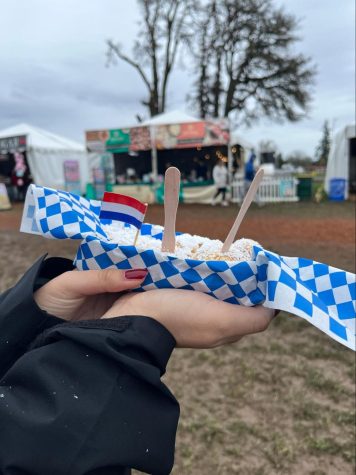
The addition of the food stuck. Visitors today can buy different types of food and drinks, including poffertjes—mini Dutch pancakes. Like the food vendors, the farm continued to grow and adapt. Originally, visitors didn’t have to pay to see the tulip fields—the goal was that they would buy bulbs while they were there. Yet, in the 2000s, people started coming just to take a photo and leave, so an entry fee was created. Once the fee was enacted though, the farm started to see more business. “So it was like we kinda created value,” said Iverson.
The entry fee covers parking, the tulip fields, display beds, a children’s play area, and as many photos as you want to take. The entry fee also covers a ‘shuttle’ to take you to and from the fields if you choose not to walk. Dogs are allowed but must be kept on a leash and cleaned up after. Food can be bought from different vendors, as well as art and jewelry from local artists.
For an extra fee, visitors can take a 45-minute ‘family tour’, where you can learn about the farm and family’s history, as well as the tulips. Those over 21 can enjoy a ‘wine tour’, similar to the ‘family tour’ but with wine and for an older audience. Depending on the weather, hot air balloon rides are also available. Due to weather conditions this year this has yet to be offered, but both the tulip farm and hot air balloon company are hopeful that the weather will get better as the season progresses.
Covid has had an impact on many businesses, and this has been no different for the Wooden Shoe Tulip Farm. During Covid, they began limiting the number of people who could come by selling their tickets only online. This process was so successful at reducing crowds that it still exists, even after restrictions have been lifted. In the past they’ve had issues with the number of people wanting to visit, creating traffic and long lines. The new system has created less stress and visitors, workers, and neighbors are all much happier.
This year, the weather has been super tough. By mid-April, most of the crop is in full bloom or past full bloom. But because of how cold and rainy it has been, only about 25% of the field is in bloom. “We started growing tulips in 1974 and we’ve never had a season like this,” said Barb Iverson. The tulips are about three weeks behind, and attendance is down by about half compared to the previous year.
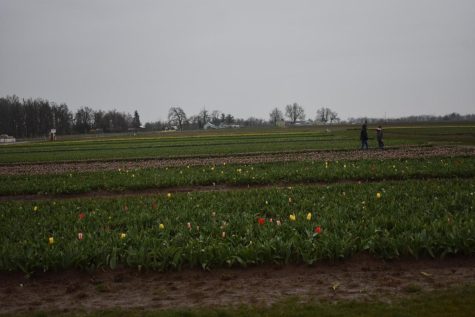
“We had some big plans on improvements we were going to make but with the weather, [and] attendance the way it is, I think those are going to just go on the back burner and we’re going to just kind of suck it in,” said Iverson. Wooden Shoe Tulip Farm is just focusing on getting through this year and is hopeful that when the weather improves the attendance does as well.
The tulips aren’t the only thing struggling either. Dave Lord is a tulip tram driver for the tulip festival. This is his third year doing it. The rain has created so much mud that during one of his tours, he almost got stuck, going only 10 or 15 feet in 15 minutes. To prevent that from happening again, he has shortened the tour to not include that section until the weather gets better.
“Last year it was a lot better weather, we had plenty of color,” said Lord. “This year we are so wet and muddy. People are understanding because, well, it’s mother nature so we just do the best we can and hope everybody enjoys.”
Both Barb Iverson’s and Lord’s favorite thing about working at the farm is getting to meet people from all over the world. By the office and gift store, there are three maps, one of the United States, one of the World, and one of Oregon, so visitors can put a push-pin in to mark where they are from. It typically takes a week to get all 50 states pinned, and by the end of the festival, there are usually 130-140 countries pinned.
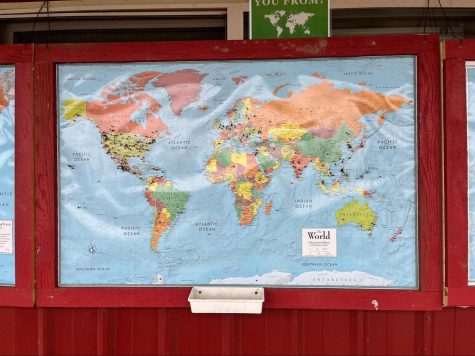
“The flowers just have a universal appeal for people,” said Iverson. “And that’s, that’s the fun part. I just hear all sorts of languages out here. You get people from all over the world. It’s just fun.”
Many people work together to put together the tulip festival; some are family, some are old friends and some are new. When you visit the Wooden Shoe Tulip Farm a familial energy can be felt, especially when talking to the staff. When you visit the festival you aren’t just coming to see tulips, you are helping continue a success story of a local farm that learned how to adapt to become a community favorite.
See more Wooden Shoe Tulip Festival pictures here:


